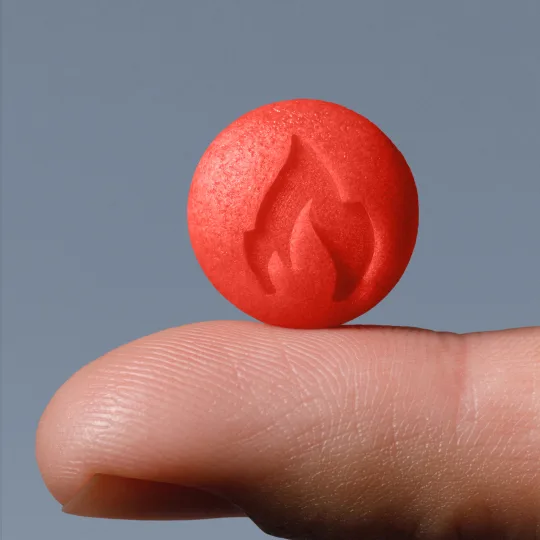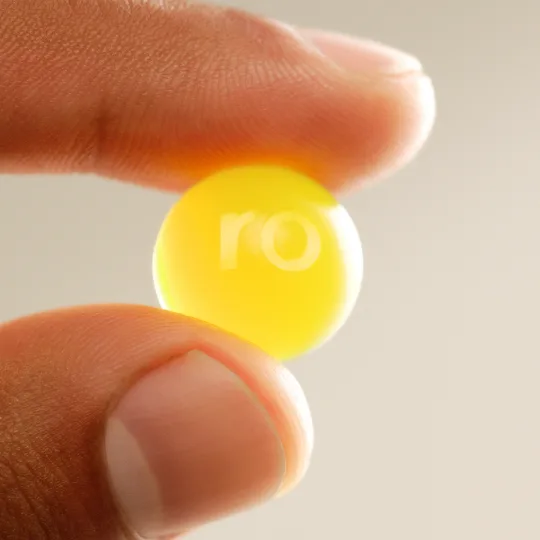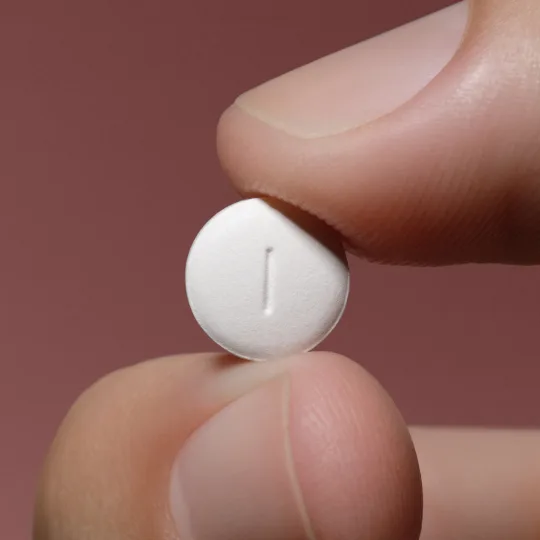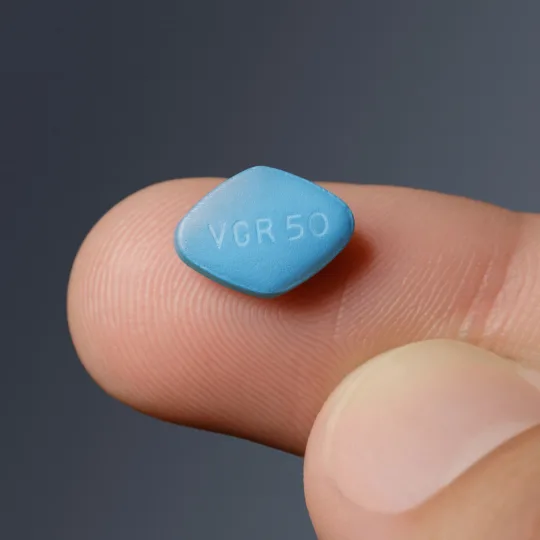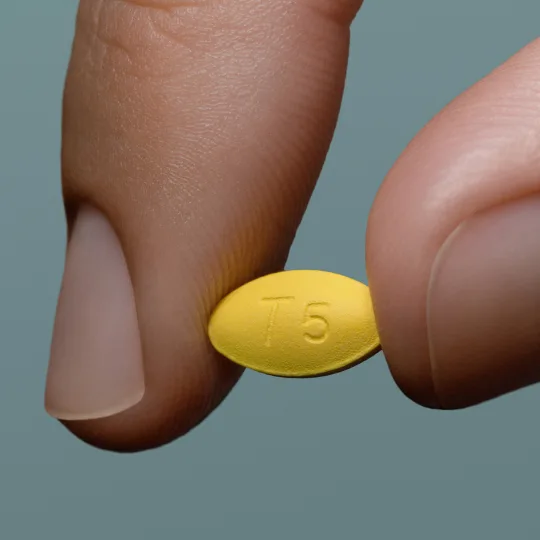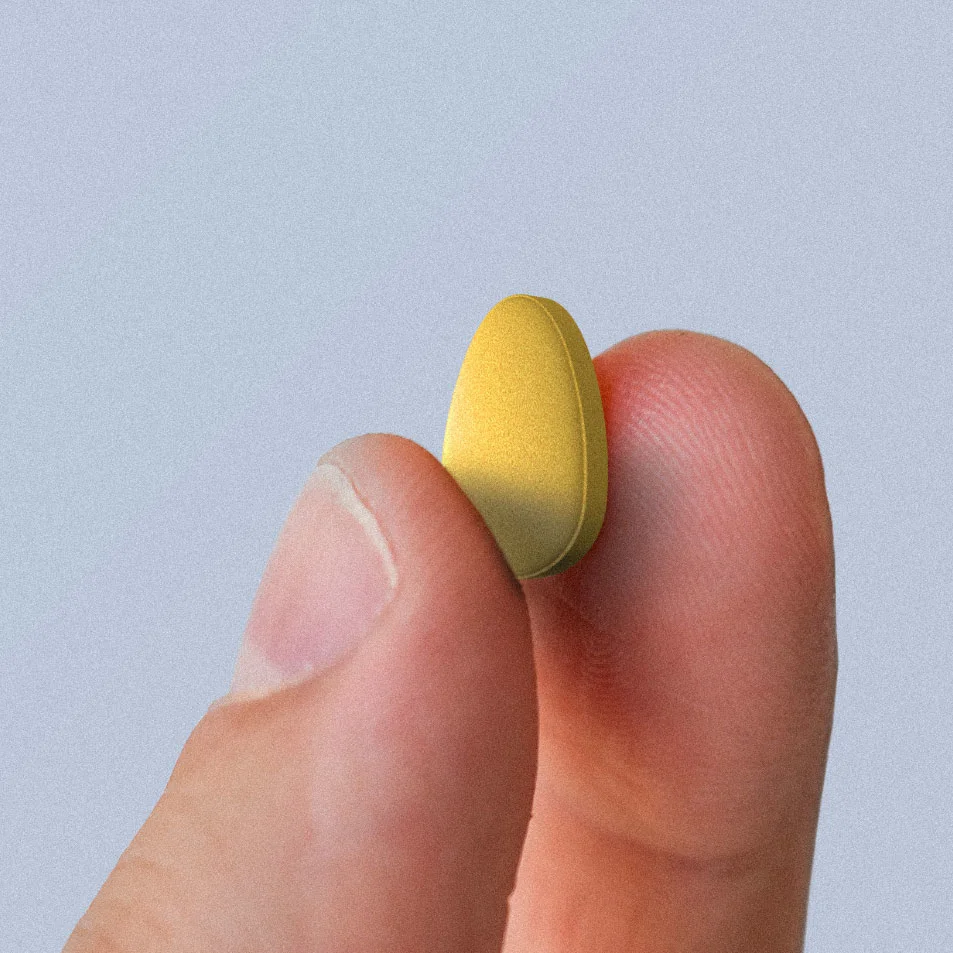Key takeaways
Sildenafil 100mg is the highest recommended dose for ED treatment. A healthcare provider may prescribe 100mg pills when lower doses, like 25mg or 50mg, aren’t effective.
Sildenafil works best when taken 30 minutes to an hour before sex and requires sexual stimulation to be effective. Taking it on an empty stomach may help it work faster, while a high-fat meal can delay absorption.
Side effects are more likely at higher doses, including headaches, facial flushing, indigestion, and dizziness.
Here's what we'll cover
Key takeaways
Sildenafil 100mg is the highest recommended dose for ED treatment. A healthcare provider may prescribe 100mg pills when lower doses, like 25mg or 50mg, aren’t effective.
Sildenafil works best when taken 30 minutes to an hour before sex and requires sexual stimulation to be effective. Taking it on an empty stomach may help it work faster, while a high-fat meal can delay absorption.
Side effects are more likely at higher doses, including headaches, facial flushing, indigestion, and dizziness.
Sildenafil (Viagra) is one of the most common medications used to treat ED. And if you’ve been prescribed Sildenafil 100mg, you may know that it’s the highest available dose of this medication. While Viagra (or its generic, sildenafil) comes in tablets ranging from 25mg to 100mg, many people start at 50mg.
So, is it OK to take 100mg of sildenafil? It depends on your individual response and medical history, but what’s most important is that you’re working with a healthcare provider to determine your optimal dose. Keep reading to better understand how to use sildenafil citrate 100mg tablets, who might need this dose, how it works, and what to consider before taking it.
What are the benefits of sildenafil 100mg?
The benefits of sildenafil 100mg may include stronger and more reliable erections, especially for people who didn’t get the results they wanted with lower doses. Sildenafil helps treat erectile dysfunction (ED) by increasing blood flow to the penis, which can make it easier to get and maintain an erection when you're sexually aroused.
Sildenafil 100mg is the highest recommended dose for treating erectile dysfunction and is usually prescribed when 25mg or 50mg isn’t effective. For some, the 100mg dose provides the right level of support, but it’s important to take it only under the guidance of a healthcare provider, since higher doses can increase the risk of side effects.
While sildenafil can also be used to treat a condition called pulmonary arterial hypertension (PAH), that’s a separate use with different dosing and specific medical oversight.
There are several factors to consider when comparing sildenafil 50mg vs 100mg doses. Here’s what to know about the 100mg option:
Most people start with sildenafil 50mg. Men with kidney or liver problems, those taking certain medications, and those older than 65 usually start with a lower dose (25mg).
The 100mg dose may be more effective for people with more severe erectile dysfunction or for those with certain health conditions that impact erectile function.
The 100mg dose carries a higher risk of side effects, so it should only be used if recommended by a healthcare provider.
If a lower dose (like 50mg) works well, there’s usually no benefit to increasing the dose. In fact, taking more than you need may raise your risk of side effects without improving results.
Regardless of the dose, sildenafil should be taken as needed, about one hour before sexual activity, and no more than once per day.
How long does it take for a sildenafil 100mg pill to work?
A sildenafil 100mg pill typically starts working fairly quickly, usually reaching its peak in your bloodstream about an hour after you take it on an empty stomach. Anywhere between 30 to 120 minutes is normal, though timing can vary from person to person. If you take it right after you eat a heavy, high-fat meal (such as a burger and fries), it can take about an hour longer to start working.
Once active, sildenafil’s effects can last up to four hours. This doesn’t mean an erection will last that long, just that the ability to get and maintain an erection with sexual stimulation is increased during that time.
If it seems to be taking longer to work, that doesn’t necessarily mean it isn’t effective. Factors like your age, overall health, and other medications can influence how your body responds. Always check in with your prescriber before making any changes to your dose.
Sildenafil citrate tablets 100mg: how can you use them most effectively?
For best results, take one sildenafil citrate 100mg tablet about one hour before sexual activity, or as directed by your prescriber. It shouldn’t be taken more than once in 24 hours. Sexual arousal is still required for sildenafil to be effective. Doses typically range from 25mg to 100mg, depending on what your healthcare provider recommends.
You can take sildenafil with or without food, but eating a high-fat meal may delay how quickly it starts working. If you want it to kick in faster, take sildenafil 100mg on an empty stomach or with a light snack.
If you’re taking other medications, especially for blood pressure or heart conditions, talk to your healthcare provider to make sure sildenafil is safe for you. Stick to the prescribed dose. Taking more than recommended can increase the risk of side effects.
How much do sildenafil 100mg tablets cost?
At Ro, a single 100mg Viagra pill costs $90, while the generic version, sildenafil, starts at $10 per pill. A 30-pill supply of Viagra 100mg costs $2,700, whereas the same supply of generic sildenafil is $300.
Ro offers Viagra 100mg and generic sildenafil through an online consultation, with free shipping and no pharmacy trip required. An alternative option is Ro Sparks,* a chewable ED tablet containing 55mg sildenafil and 22mg tadalafil, starting at $48 per month for a four-dose plan.
The cost of sildenafil 100mg can vary depending on where you buy it and whether you choose brand-name Viagra or its generic version. Brand-name Viagra tends to be more expensive, while generic sildenafil offers a more affordable alternative.
What should you consider when taking sildenafil 100mg doses?
Like many medications, sildenafil can cause side effects. The most common ones include:
Headache
Facial flushing
Indigestion or heartburn
Back pain
Stuffy nose
Lightheadedness
Nausea
Sildenafil 100mg can also commonly cause temporary vision changes, such as a bluish tint to vision or increased sensitivity to light. These vision changes are less likely with lower doses (25mg or 50mg).
In rare cases, sildenafil may increase the risk of non-arteritic anterior ischemic optic neuropathy (NAION), a serious eye condition that can cause sudden vision loss. If you have a history of eye conditions (especially retinitis pigmentosa) talk to a healthcare provider before using sildenafil.
Another rare but serious side effect is priapism, a prolonged and often painful erection lasting more than four hours. If this happens, seek immediate medical attention. If left untreated, priapism can lead to permanent damage to the penis.
While many side effects are mild, others can be more serious, and different people may experience different reactions. It’s important to stay in touch with your healthcare provider about how sildenafil is working for you. They can help you find the safest, most effective ED treatment for your needs.
Sildenafil 100mg drug interactions
Like many medications, sildenafil can interact with other medications, so it’s important to tell your healthcare provider about everything you’re taking. This includes prescription and over-the-counter drugs, as well as supplements. Here are some key sildenafil 100mg drug interactions to know:
Nitrates. Sildenafil should never be taken with nitrates. This includes prescription medications for chest pain (like nitroglycerin) and recreational drugs such as amyl nitrite ("poppers"). Taking sildenafil with nitrates can cause a life-threatening drop in blood pressure.
CYP3A4 inhibitors. Certain medications slow down the breakdown of sildenafil in the body, leading to higher concentrations and an increased risk of side effects. Examples of CYP3A4 inhibitors include ritonavir, erythromycin, and antifungals (ketoconazole, itraconazole).
Blood pressure medications. Sildenafil can enhance the blood pressure-lowering effects of antihypertensive medications. If you take medications for high blood pressure, particularly alpha-blockers such as doxazosin or tamsulosin (used for treating benign prostatic hyperplasia), sildenafil may cause a further drop in blood pressure.
Other ED or PAH meds. Avoid taking sildenafil with other PDE5 inhibitors, such as Revatio (sildenafil for PAH), Cialis, or Levitra, as this can increase the risk of side effects.
Guanylate cyclase (GC) stimulators. Do not take sildenafil with riociguat, a GC stimulator medication for PAH, due to the risk of dangerously low blood pressure.
You should not take sildenafil if you’ve ever had an allergic reaction to the medication or any of its inactive ingredients.
If you have low blood pressure, diabetes, a history of heart attack or stroke, or certain heart conditions, talk to a healthcare provider to determine if sildenafil is safe for you.
Additionally, if you have been advised to avoid sexual activity due to cardiovascular concerns or a history of heart conditions, sildenafil may not be safe for you. If you have high blood pressure, it’s generally safe to take sildenafil, but your healthcare provider may suggest checking your blood pressure or adjusting your dosage if necessary.
Remember that this list is not exhaustive, and you should share all medications you’re taking with your healthcare provider.
How to reduce the side effects of sildenafil 100mg
Most mild side effects from sildenafil go away on their own within a few hours, but there are a few steps you can take to minimize discomfort while the medication is active in your body.
Have a light meal: Many people take sildenafil on an empty stomach. Sildenafil can sometimes cause indigestion, so it helps to have a light meal instead of a high-fat meal. A heavy meal can also delay how quickly Viagra works by about an hour, according to research.
Be mindful of alcohol consumption: If you plan to drink alcohol while taking sildenafil, moderation is key. While moderate drinking (1–2 standard drinks) with sildenafil is usually fine, studies show that heavy alcohol use can increase your chances of side effects, like headaches, dizziness, or, in one case, chest discomfort. Heavy drinking (more than 15 drinks per week for men) can be particularly risky when taking sildenafil. If you're planning to have sex, you may want to limit your alcohol intake that day, especially since alcohol can affect your ability to get an erection.
Talk to your healthcare provider: If side effects persist or bother you, talk to your healthcare provider. They might be able to adjust your dose to find the lowest effective amount, change when you take the medication, or switch you to a different ED treatment that might work better for you.
Avoid over-the-counter alternatives: Avoid over-the-counter alternatives marketed as sildenafil substitutes. These products could contain harmful or unknown substances. Stick to FDA-approved medications prescribed by a licensed healthcare provider.
Where can you buy sildenafil 100mg pills?
Sildenafil 100mg is not available over the counter—you need a prescription from a healthcare provider to get it. This is because sildenafil can cause serious side effects and isn’t safe for everyone, especially those with certain medical conditions or who take specific medications.
If you’re considering sildenafil for ED, the safest option is to get it through a licensed healthcare provider.
Avoid counterfeit sildenafil
Buying sildenafil online can be risky if you're not careful. Many websites claim to sell Viagra or sildenafil at unbelievably low prices, but these offers are often too good to be true.
Studies show that up to 77% of sildenafil sold online may be counterfeit. These fake medications may contain too little or too much of the active ingredient, or worse, harmful contaminants that can be dangerous to your health.
When purchasing ED medications, it’s crucial to use a trusted source to ensure you’re getting the right dosage and a safe product.
How to get sildenafil 100mg safely
While you can visit a healthcare provider in person, online telehealth services like Ro offer a private and convenient way to get a prescription:
You can fill out a secure health questionnaire from home at any time, eliminating the need for waiting rooms or in-person visits.
A licensed healthcare provider will review your symptoms and medical history and follow up if any additional information is needed.
If prescribed, your medication will be shipped directly to your door in plain packaging, so you can avoid a trip to the pharmacy.
If you need a dosage adjustment or have any questions, you can quickly and easily follow up to ensure you’re getting the right treatment.
Getting sildenafil from a legitimate source matters, whether through a trusted pharmacy or a licensed telehealth provider. Avoid unknown sellers and stick to reputable options to ensure you’re getting safe and effective treatment.
What is sildenafil used for?
Sildenafil or brand-name Viagra is an oral medication used to treat erectile dysfunction. It belongs to a class of drugs called phosphodiesterase type 5 inhibitors (PDE5 inhibitors), which also includes tadalafil (Cialis), vardenafil (formerly Levitra), and avanafil (Stendra). These medications can help improve blood flow to the penis, making it easier to get and maintain an erection.
Sildenafil works by blocking the PDE5 enzyme, which normally causes blood vessels to constrict. During an erection, a natural chemical called cGMP helps relax and widen blood vessels in the penis. By preserving cGMP levels, sildenafil can help increase blood flow and support firmer erections.
If you're prescribed a sildenafil 100mg pill, remember that you don't automatically get an erection, you still need sexual stimulation for it to work.
Should you take sildenafil 100mg tablets?
Sildenafil 100mg may be more effective for treating ED in some people, but a higher dose can also increase the risk of side effects. If you’re considering this dosage, talk to your healthcare provider to determine if it’s the right option for you.
If you experience side effects or find that the risks outweigh the benefits, your provider may suggest adjusting your dosage or trying a different PDE5 inhibitor.
Keeping an open line of communication with your healthcare provider can help ensure you find the safest and most effective ED treatment for your needs.
For those looking for alternative options, Ro offers compounded solutions:
Daily Rise Gummies contain 7mg of tadalafil, the same active ingredient as Cialis, in a fruit-flavored gummy. This is a great option for those who prefer the benefits of daily ED treatment without the hassle of taking pills.
Ro Sparks is a fast-acting ED solution that combines sildenafil (Viagra) and tadalafil (Cialis) in a single dissolvable tablet. Each dose contains 55mg sildenafil and 22mg tadalafil, which can work within 15 minutes and last up to 36 hours.
Compounded drugs are permitted to be prescribed under federal law but are not FDA-approved.
Have better sex with Ro
Bottom line: sildenafil 100mg
Sildenafil 100mg is the highest dose commonly prescribed for ED. It’s typically recommended when lower doses (like 25mg or 50mg) haven’t been effective, but it isn’t the starting point for most people. Your ideal dose depends on how your body responds and any underlying health conditions you may have.
Here’s what to keep in mind:
100mg is the maximum dose recommended for sildenafil: It may be prescribed if lower doses don’t provide the desired results, but it also carries a higher risk of side effects like headaches, flushing, and dizziness.
Timing and food can impact how well it works: Sildenafil is most effective when taken 30 to 60 minutes before sex. Taking it on an empty stomach may help it kick in faster, while a high-fat meal could slow down absorption.
Medication interactions matter: Sildenafil can interact with nitrates, alpha-blockers, and certain other medications. Always review your medical history with a healthcare provider before starting ED treatment.
You have other FDA-approved options: ED treatments like tadalafil (Cialis), vardenafil (Levitra), and avanafil (Stendra) may be better fits for some people, depending on their preferences and health profile.
Ro offers flexible treatment choices: Other options like Ro Sparks* (a dissolvable tablet with both sildenafil and tadalafil) and Daily Rise Gummies (a daily-dose chewable) are convenient alternatives to traditional pills.
If you’re considering 100mg sildenafil, an online consultation with a licensed provider can help you safely explore the right dose and treatment plan for your needs.
Sildenafil 100mg: frequently asked questions (FAQs)
Is sildenafil stronger than the 100mg Viagra pill?
Sildenafil and Viagra 100mg tablets for erectile dysfunction are equal in strength. They come in doses ranging from 25mg to 100mg. 50mg is the most common dose, taken as needed, but maximum once a day. Your provider can change your dose to 100mg or 25mg, depending on its effect.
Is sildenafil safe to take daily?
Yes, but sildenafil should not be taken more than once per day. However, a low-dose daily ED medication, such as tadalafil, may be an option for some people. If you’re considering daily ED treatment, talk to your healthcare provider about whether tadalafil (Cialis) or Daily Rise Gummies could be a better fit.
Does sildenafil last longer than Viagra?
Sildenafil and Viagra have the same duration of action since they contain the same active ingredient. Typically, the effects can last about four hours, though this can vary based on metabolism, food intake, and other factors.
What if sildenafil 100mg pills don’t work?
If sildenafil 100mg isn’t effective, your healthcare provider may suggest trying a different ED medication.
Here are some of the sildenafil alternatives that you might consider:
Cialis (tadalafil): This is a long-lasting ED treatment that can work for up to 36 hours, allowing for more spontaneity. It’s typically taken as needed, but you do have the option of taking a lower dose every day for more consistent results.
Vardenafil: Similar to sildenafil in how it works, vardenafil is taken as-needed about an hour before sex.
Avanafil: This is another kind of PDE5 inhibitor prescribed for ED. Also known as the brand-name Stendra, avanafil kicks in as soon as 15 minutes after you take it.
However, medication isn’t the only option. Several factors can influence erectile function, and addressing them may improve your results.
Underlying health conditions, certain medications, and lifestyle factors like diet, exercise, weight, and stress levels can all play a role in erectile health. Making positive changes in these areas may improve the effectiveness of ED treatments and support better overall sexual function.
Mental health can also impact erectile function. Conditions like anxiety may make it harder to get or maintain an erection.Understanding the different types of anxiety and their symptoms and treatment options can help you figure out if this might be playing a role.
Additionally, some people use ED medications alongside cock rings, which help maintain erections by restricting blood flow after arousal. If oral medications aren’t the right fit, options like penis pumps may provide an alternative way to improve erectile function by increasing blood flow to the penis.
If you’re considering other ED treatments, a healthcare provider can help assess your options and determine the best approach for your needs.
DISCLAIMER
If you have any medical questions or concerns, please talk to your healthcare provider. The articles on Health Guide are underpinned by peer-reviewed research and information drawn from medical societies and governmental agencies. However, they are not a substitute for professional medical advice, diagnosis, or treatment.
Viagra Important Safety Information: Read more about serious warnings and safety info.
Cialis Important Safety Information: Read more about serious warnings and safety info.
References
Campbell, N., Clark, J. P., Stecher, V. J., et al. (2012). Internet-ordered Viagra (sildenafil citrate) is rarely genuine. The Journal of Sexual Medicine, 9(11), 2943–2951. doi: 10.1111/j.1743-6109.2012.02877.x. Retrieved from https://pubmed.ncbi.nlm.nih.gov/22925379/
Carbone, F. & Tack, J. (2018). The effect of sildenafil on gastric motility and satiation in healthy controls. United European Gastroenterology Journal, 6(6), 846–854. doi: 10.1177/2050640618766933. Retrieved from https://pmc.ncbi.nlm.nih.gov/articles/PMC6047290/
Dhaliwal, A. & Gupta, M. (2023). PDE5 Inhibitors. StatPearls. Retrieved on May 1, 2025 from https://www.ncbi.nlm.nih.gov/books/NBK549843/
Eli Lilly and Company. (2023). Cialis (tadalafil) tablets, for oral use: Highlights of prescribing information. Retrieved from https://pi.lilly.com/us/cialis-pi.pdf
Kim, J. N., Oh, J. J., Park, D. S., et al. (2019). Influence of Alcohol on Phosphodiesterase 5 inhibitors Use in Middle- to Old-Aged Men: A Comparative Study of Adverse Events. Sexual Medicine, 7(4), 425–432. doi: 10.1016/j.esxm.2019.07.004. Retrieved from https://pubmed.ncbi.nlm.nih.gov/31444051/
Leslie, S. W. & Sooriyamoorthy, T. (2024). Erectile Dysfunction. StatPearls. Retrieved on May 1, 2025 from https://www.ncbi.nlm.nih.gov/books/NBK562253/
Maiorino, M. I., Bellastella, G., & Esposito, K. (2015). Lifestyle modifications and erectile dysfunction: what can be expected?. Asian Journal of Andrology, 17(1), 5–10. doi: 10.4103/1008-682X.137687. Retrieved from https://pmc.ncbi.nlm.nih.gov/articles/PMC4291878/
MedlinePlus. (n.d.). sildenafil. MedlinePlus Drug Information. Retrieved from https://medlineplus.gov/druginfo/meds/a699015.html
Smith, B. P. & Babos, M. (2023). Sildenafil. StatPearls. Retrieved on May 1, 2025 from https://www.ncbi.nlm.nih.gov/books/NBK558978/
Sommer, F., Klotz, T., & Engelmann, U. (2007). Improved spontaneous erectile function in men with mild-to-moderate arteriogenic erectile dysfunction treated with a nightly dose of sildenafil for one year: A randomized trial. Asian Journal of Andrology, 9(1), 134–141. doi: 10.1111/j.1745-7262.2007.00233.x. Retrieved from https://pubmed.ncbi.nlm.nih.gov/17187165/
U.S. Food and Drug Administration (FDA). (2014). Prescribing information: Levitra (vardenafil hydrochloride) tablets, for oral use. Retrieved from https://www.accessdata.fda.gov/drugsatfda_docs/label/2014/021400s017lbl.pdf
U.S. Food and Drug Administration (FDA). (2018). Prescribing information: Stendra (avanafil) tablets, for oral use. Retrieved from https://www.accessdata.fda.gov/drugsatfda_docs/label/2018/202276s018lbl.pdf
U.S. Food and Drug Administration (FDA). (2017). Prescribing information: Viagra (sildenafil citrate) tablets, for oral use. Retrieved from https://www.accessdata.fda.gov/drugsatfda_docs/label/2017/020895s048lbl.pdf
U.S. Food and Drug Administration (FDA). (2023). Revatio (sildenafil) prescribing information. Retrieved from https://www.accessdata.fda.gov/drugsatfda_docs/label/2023/021845s025lbl.pdf
Zucchi, A., Costantini, E., Scroppo, F. I., et al. (2019). The first-generation phosphodiesterase 5 inhibitors and their pharmacokinetic issue. Andrology, 7(6), 804–817. doi: 10.1111/andr.12683. Retrieved from https://pmc.ncbi.nlm.nih.gov/articles/PMC6790582/



